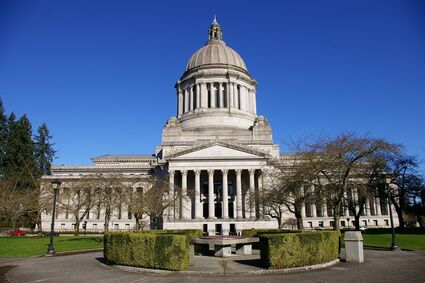OLYMPIA UPDATE
What happens during the final days of session
April 22, 2021
OLYMPIA–By the time you read this, the Washington Legislature's 2021 session will be in its final week. Our 105-day session is scheduled to adjourn, or finish, on Sunday, April 25. While many bills already have been passed, and many more "killed" so far this session, there is still plenty for legislators to do between now and the time we leave Olympia.
The highest priority will be for the Senate and House to agree on a new two-year state operating budget. The operating budget funds the day-to-day operations of state government, including early learning, K-12 education, higher education, health and human services, criminal justice, natural resources, and other areas. The state constitution requires the Legislature to pass a new state operating budget every two years, so legislators can't leave the Capitol for the year until this is done. Both chambers passed their own budget plans in recent weeks. While there are similarities between the two spending proposals, there also are differences, and the Legislature can't pass a new operating budget until those are worked out.
Over the past several days, operating-budget negotiators from all four legislative caucuses–Senate Democrats, Senate Republicans, House Democrats and House Republicans–have been meeting in what's called a conference committee to resolve differences and reach agreement on a final budget. Once those negotiators agree on a compromise, the resulting measure will be brought before the Senate and House for a vote. Unlike most bills, no amendments will be allowed–it will be a simple "yes or no" vote on the final budget. Assuming a majority of members in both chambers vote yes, the compromise operating budget will go to Gov. Jay Inslee for his consideration.
Although new two-year state capital and transportation budgets aren't constitutionally required, selected legislators also are meeting to hammer out compromises on those. In fact, I'm one of the Senate negotiators on the capital budget, which funds the construction and maintenance of state buildings, public schools, higher education facilities, public lands and parks. Other negotiators and I have been meeting regularly for over a week to reach a final agreement on this budget.
During these final days of session, the House and Senate also will try to work out differences on several bills that were originally passed by one chamber but then amended, or changed, by the other chamber. This is often called "concurrence time," in which the first chamber will decide whether to agree, or "concur," with other chamber's amendments to a particular bill, or insist that the other chamber "recede" or remove its amendments to that bill and return it to the version that was passed by the first chamber. To become law, a particular bill with the exact same text must be approved by both chambers. If one chamber can't agree with the other chamber on a bill's exact text, then that bill won't pass.
Many times, a Senate bill that is passed and sent to the House will be approved by the House without any amendments, thus going to the governor as a "clean" bill. That was the case with two bills that I prime-sponsored this session–SB 5198, which eases regulations on rural ambulance service (and was recently signed by the governor) and SB 5454, which provides temporary property-tax relief for those whose homes were destroyed or damaged by the wildfires last September.
If you have questions about any of the state budgets being considered or other bills that are still alive this session, contact my office at (360) 786-7620 or [email protected].
–Sen. Mark Schoesler, R-Ritzville, has served the 9th District since 1993.







